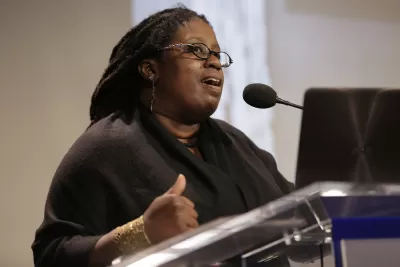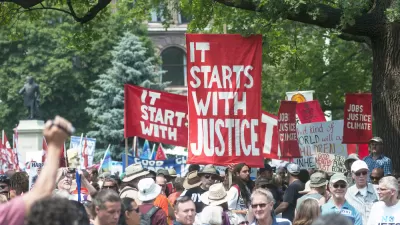Jacqueline Patterson has dedicated her career to intersectional approaches to systems change and social and environmental justice.

Jacqueline Patterson, founder and executive director of the Chisholm Legacy Project, has been recognized as one of TIME magazine’s 2024 Women of the Year. Her organization, named after the first Black woman elected to Congress, is a resource hub for Black communities facing systemic injustices worsened by environmental problems.
She was inspired to launch the Chisholm Legacy Project in 2021 after visiting the unincorporated town of Sandbranch, Texas, which was founded by formerly enslaved people after the Civil War. While only 11 miles from Dallas, until recently residents lacked running water and burned trash in their backyards, reports TIME writer Justin Worland. “[Patterson] was struck by the weight of the injustice—and by the fact that Sandbranch had slipped between the cracks of the structures that could help, namely big nonprofits.”
“Environmental issues, poverty, racial discrimination, and gender inequality all intersect to create intractable challenges. And often nonprofits bite off just one of those pieces. Patterson’s organization is taking them all on where they intersect. Her approach is at once obvious and revolutionary,” writes Worland. Patterson’s current focus is on advocating for marginalized communities to receive federal climate investment. “Economy, food, housing, transit—all of these are civil rights issues… And climate issues intersect with every single one,” she told TIME. “We want to make sure that these communities aren’t continuing to be invisibilized and forgotten.”
FULL STORY: Jacqui Patterson’s Revolutionary Approach to Climate Justice

Alabama: Trump Terminates Settlements for Black Communities Harmed By Raw Sewage
Trump deemed the landmark civil rights agreement “illegal DEI and environmental justice policy.”

Study: Maui’s Plan to Convert Vacation Rentals to Long-Term Housing Could Cause Nearly $1 Billion Economic Loss
The plan would reduce visitor accommodation by 25% resulting in 1,900 jobs lost.

Why Should We Subsidize Public Transportation?
Many public transit agencies face financial stress due to rising costs, declining fare revenue, and declining subsidies. Transit advocates must provide a strong business case for increasing public transit funding.

Wind Energy on the Rise Despite Federal Policy Reversal
The Trump administration is revoking federal support for renewable energy, but demand for new projects continues unabated.

Passengers Flock to Caltrain After Electrification
The new electric trains are running faster and more reliably, leading to strong ridership growth on the Bay Area rail system.

Texas Churches Rally Behind ‘Yes in God’s Back Yard’ Legislation
Religious leaders want the state to reduce zoning regulations to streamline leasing church-owned land to housing developers.
Urban Design for Planners 1: Software Tools
This six-course series explores essential urban design concepts using open source software and equips planners with the tools they need to participate fully in the urban design process.
Planning for Universal Design
Learn the tools for implementing Universal Design in planning regulations.
Caltrans
Smith Gee Studio
Institute for Housing and Urban Development Studies (IHS)
City of Grandview
Harvard GSD Executive Education
Toledo-Lucas County Plan Commissions
Salt Lake City
NYU Wagner Graduate School of Public Service





























